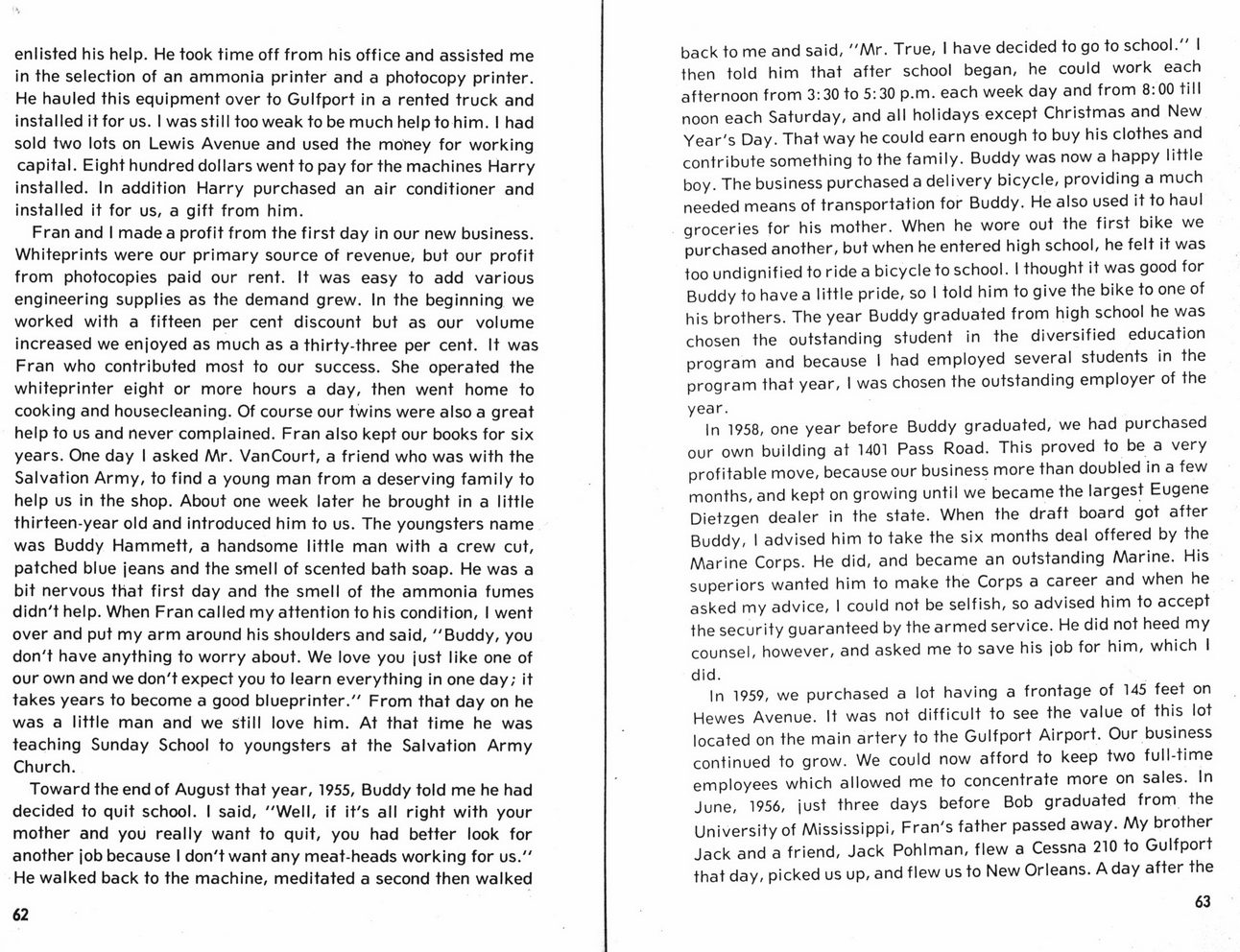This text was obtained via automated optical character recognition.
It has not been edited and may therefore contain several errors.
enlisted his help. He took time off from his office and assisted me in the selection of an ammonia printer and a photocopy printer. He hauled this equipment over to Gulfport in a rented truck and installed it for us. I was still too weak to be much help to him. I had sold two lots on Lewis Avenue and used the money for working capital. Eight hundred dollars went to pay for the machines Harry installed. In addition Harry purchased an air conditioner and installed it for us, a gift from him. Fran and I made a profit from the first day in our new business. Whiteprints were our primary source of revenue, but our profit from photocopies paid our rent. It was easy to add various engineering supplies as the demand grew. In the beginning we worked with a fifteen per cent discount but as our volume increased we enjoyed as much as a thirty-three per cent. It was Fran who contributed most to our success. She operated the whiteprinter eight or more hours a day, then went home to cooking and housecleaning. Of course our twins were also a great help to us and never complained. Fran also kept our books for six years. One day I asked Mr. VanCourt, a friend who was with the Salvation Army, to find a young man from a deserving family to help us in the shop. About one week later he brought in a little thirteen-year old and introduced him to us. The youngsters name was Buddy Hammett, a handsome little man with a crew cut, patched blue jeans and the smell of scented bath soap. He was a bit nervous that first day and the smell of the ammonia fumes didn't help. When Fran called my attention to his condition, I went over and put my arm around his shoulders and said, "Buddy, you don't have anything to worry about. We love you just like one of our own and we don't expect you to learn everything in one day; it takes years to become a good blueprinter." From that day on he was a little man and we still love him. At that time he was teaching Sunday School to youngsters at the Salvation Army Church. Toward the end of August that year, 1955, Buddy told me he had decided to quit school. I said, "Well, if it's all right with your mother and you really want to quit, you had better look for another job because I don't want any meat-heads working for us." He walked back to the machine, meditated a second then walked 62 back to me and said, "Mr. True, I have decided to go to school." I then told him that after school began, he could work each afternoon from 3:30 to 5:30 p.m. each week day and from 8:00 till noon each Saturday, and all holidays except Christmas and New Year's Day. That way he could earn enough to buy his clothes and contribute something to the family. Buddy was now a happy little boy. The business purchased a delivery bicycle, providing a much needed means of transportation for Buddy. He also used it to haul groceries for his mother. When he wore out the first bike we purchased another, but when he entered high school, he felt it was too undignified to ride a bicycle to school. I thought it was good for Buddy to have a little pride, so I told him to give the bike to one of his brothers. The year Buddy graduated from high school he was chosen the outstanding student in the diversified education program and because I had employed several students in the program that year, I was chosen the outstanding employer of the year. In 1958, one year before Buddy graduated, we had purchased our own building at 1401 Pass Road. This proved to be a very profitable move, because our business more than doubled in a few months, and kept on growing until we became the largest Eugene Dietzgen dealer in the state. When the draft board got after Buddy, I advised him to take the six months deal offered by the Marine Corps. He did, and became an outstanding Marine. His superiors wanted him to make the Corps a career and when he asked my advice, I could not be selfish, so advised him to accept the security guaranteed by the armed service. He did not heed my counsel, however, and asked me to save his job for him, which I did. In 1959, we purchased a lot having a frontage of 145 feet on Hewes Avenue. It was not difficult to see the value of this lot located on the main artery to the Gulfport Airport. Our business continued to grow. We could now afford to keep two full-time employees which allowed me to concentrate more on sales. In June, 1956, just three days before Bob graduated from the University of Mississippi, Fran's father passed away. My brother Jack and a friend, Jack Pohlman, flew a Cessna 210 to Gulfport that day, picked us up, and flew us to New Orleans. A day after the 63

True, Jim Yours Truly-033